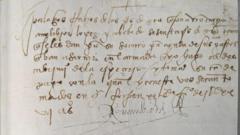In a commendable act of cultural preservation, the FBI has successfully returned a 500-year-old manuscript page signed by the famed Spanish conquistador Hernán Cortés to Mexico. This document, dated 1527, forms part of a larger collection—15 pages thought to have been illicitly removed from Mexico's national archives between 1985 and 1993. The manuscript, detailing financial transactions for supplies during Cortés’s expeditions, was located in the United States and repatriated on Wednesday.
FBI Returns Historic Conquistador Manuscript to Mexico

FBI Returns Historic Conquistador Manuscript to Mexico
The repatriation marks a significant cultural restoration as a 500-year-old document is returned to its rightful home.
Cortés, who played a crucial role in the fall of the Aztec Empire and the establishment of Spanish rule in the Americas, penned this particular document after being appointed governor of New Spain by the Spanish crown. Its contents shed light on the preparations for exploration across territories that would forge into the vast colony of New Spain, which encompassed parts of western and central North America through to Latin America.
The theft was uncovered when Mexican archivists realized, during a 1993 microfilming project, that 15 signed pages by Cortés were missing from their records. They had imprinted a unique wax number on the documents during the 1985-1986 cataloging period, indicating these pages had been taken in the timeframe between the two cataloging efforts. The FBI's art crime team, upon receiving a formal request from the Mexican government in 2024, utilized open-source intelligence to track down the location of the missing manuscript.
Although the FBI kept specific details of its recovery secret—including the location where it was found and previous ownership—no prosecutions are underway, as the manuscript changed hands multiple times since its theft.
Special Agent Jessica Dittmer from the FBI emphasized the historical significance of the document, highlighting its invaluable insights into the exploratory undertakings of the era. She stated, “This volume really adds flavor to our understanding of planning and expenses related to the discovery of the spice lands,” regions that motivated European powers to seek new trade routes in Asia, which ultimately led to accidental voyages to the Americas.
This diplomatic gesture arrives amidst prevailing strains between the US and Mexico, fueled by issues such as tariffs and ongoing immigration challenges. Nonetheless, Dittmer noted that the FBI views the United States as a major player in combating the illicit antiquities market, asserting the importance of returning artifacts that symbolize key moments in the cultural history of nations.
With the manuscript’s return, the FBI has expressed its commitment to locating the remaining missing pages and ensuring their appropriate restitution. This return follows another document signed by Cortés that was handed back to the Mexican government in 2023, reflecting an ongoing partnership in cultural preservation.
The theft was uncovered when Mexican archivists realized, during a 1993 microfilming project, that 15 signed pages by Cortés were missing from their records. They had imprinted a unique wax number on the documents during the 1985-1986 cataloging period, indicating these pages had been taken in the timeframe between the two cataloging efforts. The FBI's art crime team, upon receiving a formal request from the Mexican government in 2024, utilized open-source intelligence to track down the location of the missing manuscript.
Although the FBI kept specific details of its recovery secret—including the location where it was found and previous ownership—no prosecutions are underway, as the manuscript changed hands multiple times since its theft.
Special Agent Jessica Dittmer from the FBI emphasized the historical significance of the document, highlighting its invaluable insights into the exploratory undertakings of the era. She stated, “This volume really adds flavor to our understanding of planning and expenses related to the discovery of the spice lands,” regions that motivated European powers to seek new trade routes in Asia, which ultimately led to accidental voyages to the Americas.
This diplomatic gesture arrives amidst prevailing strains between the US and Mexico, fueled by issues such as tariffs and ongoing immigration challenges. Nonetheless, Dittmer noted that the FBI views the United States as a major player in combating the illicit antiquities market, asserting the importance of returning artifacts that symbolize key moments in the cultural history of nations.
With the manuscript’s return, the FBI has expressed its commitment to locating the remaining missing pages and ensuring their appropriate restitution. This return follows another document signed by Cortés that was handed back to the Mexican government in 2023, reflecting an ongoing partnership in cultural preservation.

















